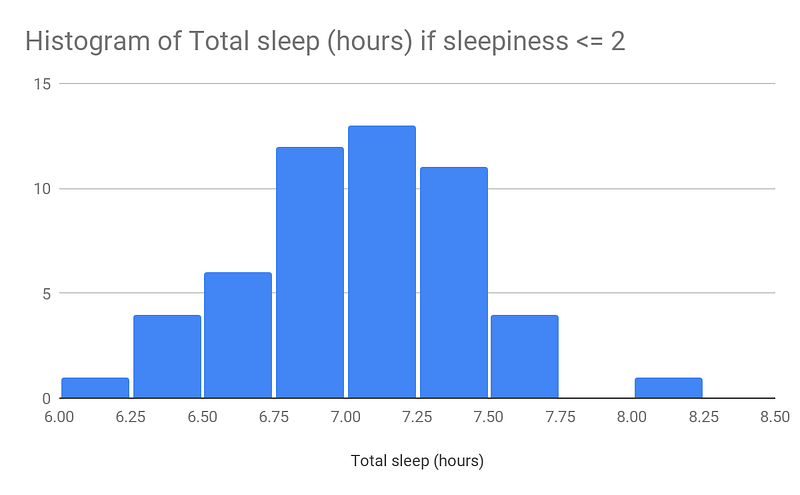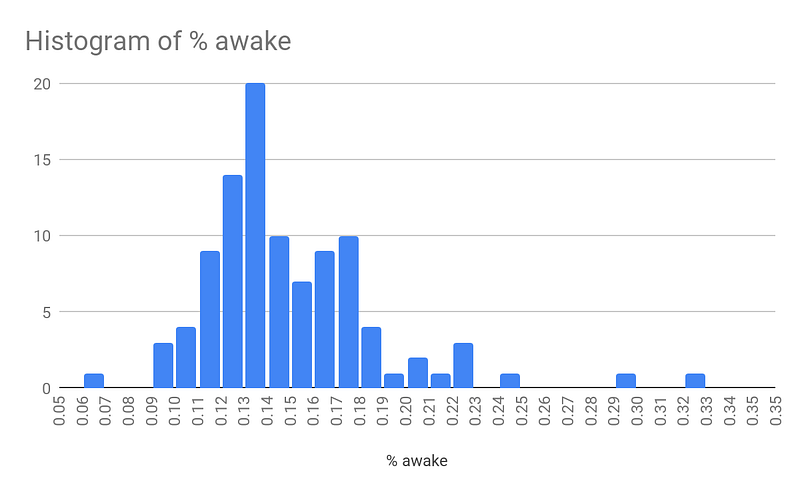Spring 2021 Theme
As I said in an earlier post, I’ve decided to forgo new year’s resolutions this year and try The Theme System from CGP Grey and Myke Hurley. You can get an overview from CGP Grey’s video. This post is to discuss my theme and a quantified self deep dive. The deep dive is into some of my personal data as my first steps toward my theme.
[Also posted on medium.]
Theme: Being Well-Rested
My semester’s theme is “Being Well-Rested.” Despite being long, this theme resonates with me and has a bunch of stuff behind it. So bear with me.
The biggest thing impacting this semester is this spring semester is going to be rough. It is my first time teaching entirely online from start to finish because I was on parental leave last fall. Technically I taught online when Covid-19 hit us mid-Spring 2020, but while I did work right up to my baby’s birth, I wasn’t the main person running things for most of the online part of Spring 2020. I made decisions on the transition, finished the teaching materials, and converted the exams to online, but I did not manage the day-to-day stuff.
Moreover, I am co-teaching two classes that I have never taught before. So I’ll be spending a lot of time learning the class curriculums. Thankfully, my co-teacher is the same person and has led the classes once before. However, there’s also the overhead of coordinating with my co-teacher and doing our best to keep which class is which straight in our heads. My hope is this theme will help me be mindful of how I feel so I don’t burn out.
I also chose the words “being well-rested” very carefully. For example, I could have just chosen “sleep.” However, it’s not clear to me that only making my sleep better is what I need to improve my well-being. Moreover, The Theme Systems’s creators talk about how the theme should be something meaningful to you, and “sleep” just doesn’t resonate with me. So instead, I chose as my theme why I would want good sleep, which is to feel rejuvenated and rested enough to function well without caffeine (I love coffee, but I am one of the weird people that drinks mostly decaf. I do that because I want caffeine to work when I need it to.).
Quantified Self Deep Dive: Sleep
The first way I decided to tackle my theme was to better understand my sleep. Some aspects of my sleep always made me feel guilty (like not getting enough sleep or not going to bed early enough). I also wanted to take advantage of all the sleep data I’ve been collecting to understand how much sleep I need and to tame the guilt. My data is a mix of personal survey data and my FitBit that I wrote down in a spreadsheet. I’ve been tracking this data since 7/6/2019. And my spreadsheet always gave me summary statistics, like a rolling average of my sleep, but that number was more a source of guilt than information on how I could change things to make things better. I’m writing this blog post to get myself to analyze my data differently, such that I have some action items I can take away from it.
So I have a few key pieces of information. First is my survey data of how I feel on a 1 to 5 scale. 1 meant I am chipper and happy to start the day (this rarely if ever happens). 5 meant I’m asleep on my feet. A 2 meant I was tired, but I am awake enough that I don’t need caffeine. I wrote this score down right when I woke up and around mid-morning when I decided if I needed caffeine.
The second set of information are timestamps of when I lie down in bed, which I manually enter, and my Fitbit’s report on when I started sleeping, when I got up, and how long I was awake throughout the night. This data lets me derive how much time I was in bed, how much I slept, the percent of the time I was awake, how long it took me to settle in for my FitBit to register that I was asleep, and a rolling average with alpha=0.3 of how much sleep I’ve been getting. When I lie down in bed and the rolling average were the primary sources of my guilt as it told me I wasn’t going to bed when I thought I should nor getting the amount of sleep I felt I needed.
So how did I analyze my data? First, I only used the last 100 days. Because, as I’m sure every parent knows, having a 10-month-old is not a recipe for good sleep, especially one that seems to prefer me to my spouse. Nor does having a 3-year-old that still doesn’t sleep through the night. Thankfully, 99% of the time, he screams for my spouse when he wakes up (it’s really 100%, but I refuse to jinx myself). Moreover, a baby’s sleep pattern seems to change daily, or in other words, there is no pattern. Therefore, even though I had over 550 rows in my data set, it did not make sense to use everything because the variance would be too high. Hence, I focused on the last 100 days.
The first question I sought to answer is how much sleep do I need to feel like a <= 2 on my survey data scale? To start, I did a simple filter on all the days I wrote down <= 2 at mid-morning (see below) because I cared more about how I felt then than first thing in the morning. And it looks like I had a normal distribution. The mean was 6.98, with a median of 7.00 and a standard deviation of 0.42. The plot and statistics pretty much clinched the answer that as long as I’m breaking 7 hours, I’m actually okay! This news relieved a lot of the guilt that I wasn’t getting 7.5 hours of sleep, which is what I thought I needed. However, rather than aiming for 7 hours, I decided to aim for 7.25 hours since there is some wiggle room in there, and the likelihood of perfectly hitting 7 is kind of low.

However, this was just my sleep. It didn’t count all the times I woke up by myself or, more often, due to a small child. The baby and the 3-year-old wake me up because even though the 3-year-old calls for my spouse, that doesn’t mean I don’t wake up when he’s calling for daddy.
So the next question is what % awake should I assume and therefore buffer in when calculating how much time I actually should be trying to sleep. To answer this question, I started by looking at the % I was awake (see graph below). And while I haven’t done a statistical test to confirm it, that looks kind of bimodal to me and is likely due to the enormous difference in the numbers when the baby does and does not wake me up in the middle of the night a lot. By eye, it looks like when the baby doesn’t wake me up, the mean is around 13.5%. And when she does, it’s 17.5% with a long tail. Overall the mean is 14.98%, with a median of 13.98% and a max of — a whopping — 32.71%. I’m actually a little surprised the long tail isn’t pulling the mean further to the right. Taking all of this into account, I settled for assuming that I’ll be awake 15% of the time I’m trying to sleep, partially because compensating for something like 20% felt too high.

So then the million-dollar question, if my goal is to get up at 6:00 am, when do I need to go to bed? Well, if I’m awake 15% of the time, I need 85% of the time to equal 7.25 hours, which means I need a total of 8.52 hours or 8 hours and 32 minutes. A little bit of rounding to get a reasonable number means I need to be in bed by 9:30 pm. I’m sure to some this seems early. But since I was bracing myself for needing 7.5 hours and needing to be in bed by 9:00 pm, this felt doable.
Reflection
Have I been achieving my goal of 9:30 pm bedtimes since I did the calculations to figure it out? No. The beginning of the semester has been brutal. I’ve been working both days of the weekend. If I scratch out a few hours of not working in the middle of a weekend day, I count that as an accomplishment. But at least I know what I’m aiming for, and I know how to get there. The rest of the time, there is always caffeine to get me through.
Going Forward
Besides sleep, I’ve started focusing on what I need to do to feel like going to bed because part of my problem of not getting enough sleep is I’m not going to bed on time. This focus has led me to be more mindful of what activities before bed made me feel more relaxed or one step closer to going to bed. I mainly tried to pay attention when I have the “itch” to do one more thing before bed and what activities make that “itch” less urgent. I’ve now learned that social media does not help and is often a time suck. So I check social media once before bed, but afterward, when I feel the “itch” to go to social media again, I just ride it out or pick something else to do rather than open that app on my phone. I also do a mindfulness technique where I let myself feel the “itch” to do something and then turn to focus on how tired I am. So far, it sometimes helps me to just go to bed instead of staying up any later. I’ve also learned from this mindfulness activity that I don’t actually need to spend a lot of time doing specific activities like reading a book or crocheting to get the benefit of feeling more like going to bed. I think my problem now is having little impulse control to stop doing those activities because the semester is tiring me out so much.
The last thing I haven’t started working on much is figuring out what rejuvenates me. The things that help me decompress from the day so I feel ready for bed are sort of rejuvenating. But I want to seek out more activities to learn more about what I enjoy doing.
Conclusion
How about you all? Do you have a theme? What have you done to work towards your theme?
Comments
Post a Comment